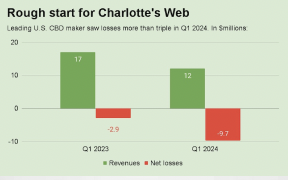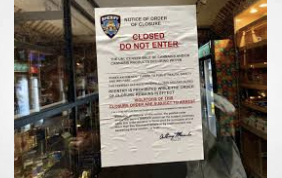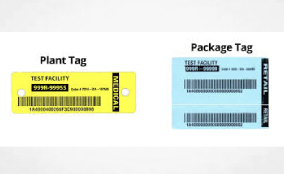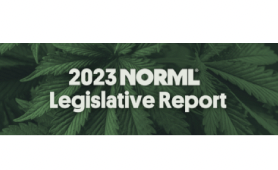2023 marks yet another successful year for the advancement of marijuana policy reform in the United States. Four additional states – Delaware, Maryland, Minnesota, and Ohio – and one US territory (the Virgin Islands) enacted policies legalizing adult-use marijuana possession and regulating retail cannabis markets. Four of these jurisdictions did so via legislative action, while Ohio did so by public vote. Now, for the first time since the adoption of federal marijuana prohibition in 1937, more Americans reside in a jurisdiction where cannabis is state-legal than do not.
View Legislation by Category
In addition to the passage of these new legalization laws, legislators in many states took action expanding the rights and liberties of cannabis consumers. Several states enacted policies protecting consumers from workplace discrimination. Others took steps to facilitate the expungement of criminal records for those previously convicted of certain marijuana-related offenses. In recent years, 24 states have enacted marijuana expungement laws – resulting in the vacating of an estimated 1.7 million criminal records, and ten states and the District of Columbia have passed laws prohibiting employers from either firing or refusing to hire employees who consume cannabis in their off-hours.
Lawmakers also continue to pass legislation expanding patients’ access to medical cannabis. This year, Kentucky became the 38th state to enact a regulatory framework regulating the production and dispensing of medical cannabis products to authorized patients. Other states amended their laws to provide patients with increased access to medical marijuana and/or expanded the pool of patients who may use them.
This legislative progress illustrates that state lawmakers are growing more responsive to the public’s demand for meaningful cannabis policy reform. According to recent polling, seven in ten Americans believe that the use of marijuana should be legal. NORML believes that public and political support for legalization and related legislative changes in marijuana laws will continue to grow in 2024 and beyond. As we look ahead to next year’s state legislative sessions, we anticipate that lawmakers will continue to advance these and other marijuana-related issues. As always, NORML will be tracking the progress of these legislative efforts and providing NORML members with timely alerts and status updates.
Your support as a NORML member and financial contributor helps ensure that cannabis consumers are represented in the political process, and it powers our movement to end prohibition once and for all. If you have not already done so, please consider becoming a NORML member and joining our efforts.
 Adult-Use Legalization
Adult-Use Legalization
Delaware
Lawmakers in April passed a pair of complementary bills, House Bill 1 and House Bill 2, both of which became law absent the Governor’s signature. House Bill 1 eliminates penalties for the possession of personal use quantities of cannabis flower and other products, including marijuana paraphernalia, for those age 21 or older. (Personal use under the law is defined as one ounce or less of cannabis flower, 12 grams or less of concentrated cannabis, or edible cannabis products containing 750 milligrams or less of THC.) It also reduces penalties for marijuana-related violations for those under the age of 21 to a civil fine. House Bill 2, otherwise known as the Delaware Marijuana Control Act, establishes a licensing system to regulate marijuana production and retail sales. It calls for the issuance of up to 30 initial retail marijuana licenses, 30 manufacturing licenses, 60 cultivation licenses, and five testing licenses. Read more.
Maryland
Democrat Gov. Wes Moore signed legislation (Senate Bill 516) in May implementing a voter-approved referendum governing the production, sale, and use of cannabis for adults. Retail cannabis sales began on July 1. The new law also increased possession limits for registered patients and for the first time allowed them to home-cultivate marijuana. Read more.
Minnesota
Democratic Gov. Tim Walz signed legislation (HF100/SF73) into law in May permitting adults to purchase (up to two ounces from state-licensed retailers and/or eight grams of concentrate and 800 milligrams worth of edible products), home-cultivate (up to eight plants, no more than four of which can be mature), and possess (up to two pounds in private) cannabis. The bill also facilitates the automatic review and expungement of records for those previously convicted of certain marijuana-related violations. It creates a new state agency, the Office of Cannabis Management, to oversee licensing commercial cannabis growers, retailers, and delivery services. Read more.
Ohio
Voters in November approved a citizens-initiated measure, Issue 2.The law, which took effect on December 7th, allows for adults to possess up to 2.5 ounces of marijuana or 15 grams of marijuana extracts. Ohioans are also permitted to grow up to 12 plants in a private residence (where at least two adults reside). Other provisions in the law establish a licensed system for the commercial production and retail sale of cannabis products. However, because voters passed Issue 2 as a statutory question rather than a constitutional amendment, state lawmakers still have the option of amending, or even repealing, its provisions. Read more.
Virgin Islands
Virgin Islands’ (population: 106,000) Governor, Albert Bryan Jr. signed legislation (Act 8680) into law in January regulating the adult-use cannabis market and providing relief to those with past marijuana-related convictions. The Virgin Islands Cannabis Use Act creates an ‘Office of Cannabis Regulation’ to establish rules governing the commercial cannabis market. Under the law, those age 21 or older will be permitted to purchase cannabis products from licensed establishments and consume cannabis on-site at licensed lounges. Members of faith-based organizations who consume cannabis for sacramental purposes will be permitted to home-cultivate limited quantities of cannabis (up to six mature plants) for their own personal use. The new law also reaffirms the rights of qualified patients to access cannabis. Read more.
 Expungement
Expungement
Louisiana
Democratic Gov. John Bel Edwards signed House Bill 286 into law in 2023 facilitating the expungement of marijuana possession convictions. The new law allows for first-time marijuana possession offenders to file a request for an expungement of their records within 90 days of their conviction. (Previously, the law mandated a waiting period of five years before one could file a petition with the courts to have their records sealed.) Costs specific to the filing are capped at $300. Read more.
New Mexico
House Bill 314 was signed into law in March by Democratic Gov. Michelle Lujan Grisham. It facilitates a process whereby those with past cannabis convictions can verify that their criminal records have been expunged. The law permits persons charged with offenses eligible for automatic expungement to “verify whether automatic expungement has occurred, and [to] request expedited automatic expungement if eligible charges have not yet been expunged.” Read more.
Ohio
Republican Gov. Mike DeWine signed comprehensive sentencing reform legislation, Senate Bill 288, into law in January. Provisions in the legislation amend state law so that the arrest or conviction for the possession of marijuana paraphernalia no longer qualifies as part of a person’s criminal record and doesn’t need to be disclosed “in response to any inquiries about the person’s criminal record.” Other provisions in the law provide pathways so that those with misdemeanor marijuana convictions can petition the courts to have their records sealed within one year. Read more.
Washington, DC
DC Mayor Muriel Bowser signed B24-0063: The Second Chance Amendment Act into law. Congress allowed the law to take effect earlier this year. It provides for the automatic review and expungement of any convictions or citations specific to marijuana-related offenses that have subsequently been decriminalized or legalized in the District of Columbia, as well as any “records related only to simple possession for any quantity of marijuana in violation of D.C. Code § 48-904.01(d)(1) before February 15, 2015.” It requires all cannabis-specific expungements to be processed by the courts by January 1, 2025. Read more.
 Medical Marijuana
Medical Marijuana
California
Senate Bill 302, aka Ryan’s Law, was signed into law in October by Democratic Gov. Gavin Newsom. It permits older patients suffering from chronic diseases to legally access certain cannabis products in private hospitals and other eligible health care facilities. Read more.
Florida
In June, Republican Gov. Ron DeSantis signed House Bill 387 into law. It permits physicians to issue medical cannabis authorizations and renew certifications to eligible patients via telehealth appointments.In addition, itgrants medical marijuana treatment center licenses to Black farmers, improving equity in the growing cannabis industry. Read more.
Kentucky
Democratic Gov. Andy Beshear signed Senate Bill 47 into law in March. It directs the state’s Cabinet for Health and Family Services to implement a medical cannabis access program. Under the law, patients with chronic pain, epilepsy, post-traumatic stress, spasticity, and other designated conditions will be able to obtain an uninterrupted 30-day supply of medical cannabis. Qualified patients who test positive for the presence of carboxy-THC on a urine drug test will “not be considered to be under the influence.” Patients cannot face discrimination with respect to medical procedures (e.g., organ transplants), child visitation, or school enrollment solely due to their medical cannabis patient status. Read more.
Louisiana
Governor John Bel Edwards signed House Bill 460 into law in June. It expands the number of state-licensed cannabis pharmacies. These new licensing regulations seek to provide a more equitable geographic distribution of marijuana dispensing facilities throughout the state. Read more.
New Hampshire
Republican Gov. Chris Sununu signed legislation, House Bill 611, in August expanding medical cannabis access and creating an adult-use legalization task force. The bill removes the requirement that only those in severe pain may access medical cannabis products as a treatment of last resort and established a commission to study the feasibility of regulating adult-use cannabis sales in state-owned stores. Read more.
North Dakota
Republican Gov. Doug Burgum signed Senate Bill 2068 into law in March, increasing the quantity of THC-infused products that patients may legally possess at any one time. Read more.
House Bill 1478 was also signed into law in March. This bill permits terminally ill patients to use proof of their admittance in hospice care in lieu of a doctor’s written recommendation to register as a medical cannabis patient.
Utah
Republican Gov. Spencer Cox signed Senate Bill 46 into law in March. It limits state employers from taking punitive actions against public employees who consume medical cannabis products at home in compliance with the state’s access law. The measure also forbids judges and juries from discriminating against medical cannabis patients in the course of judicial proceedings. Read more.
The Governor also signed separate legislation, House Bill 230, appropriating $650,000 in funding for the creation of the Center for Medicinal Cannabis Research. The Center is directed to “facilitate and support funding for research related to the efficacy and potential health effects of various cannabis delivery methods, including vaporizing, ingesting, topical application, and combustion; shall support researchers in applying for and securing federal and private research grant funding for expanding medical cannabis research; shall review current and future cannabis research literature, clinical studies, and clinical trials; [and] shall educate medical providers, lawmakers, and the public about medical cannabis research advances.” Read More.
Vermont
House Bill 270 took effect in June absent the Governor’s signature. The bill increases the quantity of plants that patients may home-cultivate to six mature plants and 12 immature plants. The law also increases the maximum allowable THC content in a single edible cannabis product from 50 to 100 mg, expands the list of qualifying conditions for medical cannabis treatment, increases the number of patients a caregiver may provide services for at any one time, and removes annual registration fees for qualifying caregivers. Read more.
Virginia
House Bill 1598 and Senate Bill 788 were signed into law in April by Republican Gov. Glenn Youngkin. This legislation transfers oversight and administration of the Commonwealth’s medical cannabis program from the Board of Pharmacy to the Virginia Cannabis Control Authority. Read more.
The Governor also signed legislation, House Bill 1846, House Bill 2368, and Senate Bill 1337, amending numerous provisions regarding the Commonwealth’s medical cannabis program, including requirements for recordkeeping, product registration, expiration dates, allowable deviations, dispensing, packing, labeling, and advertising, and eliminating the requirement that certifying practitioners register with the state in order to issue written certifications to patients. Read more.
Washington
Democratic Gov. Jay Inslee signed legislation, House Bill 1563, into law strengthening legal protections for patients. It enacts immediate protections for patients at the time they receive their written authorization from a physician rather than when they receive their state-issued registration card.
Washington, DC
B24-0013 significantly expanded medical cannabis operations in the District of Columbia. The Medical Cannabis Amendment Act increased the number of licensed dispensaries that can operate in the District, enacted tax relief for operators, codified the ability for individuals to “self-certify” that they have a need for medical marijuana, and created new cannabis business categories, such as on-site tasting/consumption lounges, among other changes. It also provides opportunities for unregulated operators to apply for licensure and provides law enforcement and regulators with expanded powers to crack down on unlicensed establishments that fail to do so. Read more.
 Workplace Drug Testing
Workplace Drug Testing
California
Governor Gavin Newsom signed legislation in October, Senate Bill 700, making it unlawful for employers to “request information from an applicant for employment relating to the applicant’s prior use of cannabis.” The legislation expands upon worker protections initially passed into law in 2022 making “it unlawful for an employer to discriminate against a person in hiring, termination, or any term or condition of employment, or otherwise penalize a person, if the discrimination is based upon the person’s use of cannabis off the job and away from the workplace.” Both worker protection laws take effect on January 1, 2024. Read more.
Michigan
In July, members of the Michigan Civil Service Commission voted to amend state regulations ending the practice of pre-employment marijuana screening for most state workers. (Exceptions to the new rules remain for those in certain safety sensitive positions, like law enforcement personnel.) Those previously denied positions because of a failed marijuana test are eligible under the law to immediately reapply for employment. The new rules took effect in October. Read more.
Washington
Democratic Gov. Jay Inslee signed legislation, Senate Bill 5123, into law prohibiting employers from taking adverse actions against new hires because of a failed drug test for marijuana. The law makes it unlawful for an employer to discriminate against a person in the initial hiring for employment if the discrimination is based upon: (a) The person’s use of cannabis off the job and away from the workplace; or (b) An employer-required drug screening test that has found the person to have non-psychoactive cannabis metabolites in their hair, blood, urine, or other bodily fluids. The new law does not apply to safety sensitive employees. Read more.
 Industry
Industry
California
Governor Gavin Newsom signed Assembly Bill 128 into law in 2023, granting state regulators the authority to license ‘Cannabis Event Organizers.’ Organizers are defined under the law as “a licensee authorizing onsite cannabis sales to, and consumption by, persons 21 years of age or older at a county fair event, district agricultural association event, or at another venue expressly approved by a local jurisdiction.” Read more.
Colorado
House Bill 1279 was signed into law by Democratic Gov. Jared Polis in June. The law allows licensed retailers, for the first time, to “accept payment online for the sale of retail marijuana and retail marijuana products.” Read more.
Connecticut
HB 6491 was signed into law in June by Democratic Gov. Ned Lamont. The law permits state-licensed cannabis businesses to deduct ordinary business expenses, reducing their state tax burden. Read More.
Illinois
Democratic Gov. JB Pritzker signed legislation (House Bill 3817) allowing licensed marijuana businesses to take state-level tax deductions. Read more.
Maine
Democratic Gov. Janet Mills signed legislation, Legislative Document 1063, into law permitting state-licensed cannabis businesses, including testing facilities, to be eligible to take state tax deductions. Read More.
Nevada
Republican Gov. Joe Lombardo signed legislation, Senate Bill 277, into law increasing the quantity of cannabis that adults may legally purchase and possess to 2.5 ounces of cannabis flower and/or up to one-quarter of an ounce of concentrates. Other provisions in the law permit licensed retailers to dually serve adults and patients, and also allow for those with prior convictions to apply to work in the licensed cannabis industry. The new possession limits take effect on January 1, 2024. Read More.
New Jersey
Legislation, NJ A5323, became law allowing licensed marijuana businesses to deduct certain expenses on state tax returns related to the sale, production, or distribution of cannabis products. The law attempts to offset burdens on dispensaries under Section 280E of the federal tax code. Read More.
New York
Democratic Gov. Kathy Hochul signed legislation, S 7508, into law in November permitting licensed cannabis businesses to apply for local/municipal tax deductions. Read More.
The Governor also signed separate legislation, S 1047, encouraging greater relationships between banks and state-licensed cannabis businesses. Read More.
 Miscellaneous
Miscellaneous
Maine
Legislation, LD 1311, became law in July absent the Governor’s signature. It amends rules surrounding the use of cannabis by those on probation or parole by limiting the ability of the courts to order those on probation, parole, or pre-trial release to refrain from the use of cannabis. Read More.
Maryland
Democratic Gov. Wes Moore signed legislation, House Bill 232, amending the state’s child neglect statutes so that the use of cannabis by a parent or a child’s guardian is no longer considered to be prima facie evidence of a crime. Read more.
The Governor also signed separate legislation, House Bill 1071, into law prohibiting police from initiating a stop or a search of a person or their vehicle based solely on the odor of burnt or unburnt marijuana. Additionally, the law reduces penalties for the public use of cannabis to a civil fine of $50 for a first offense and $150 for subsequent offenses. Read More.

















